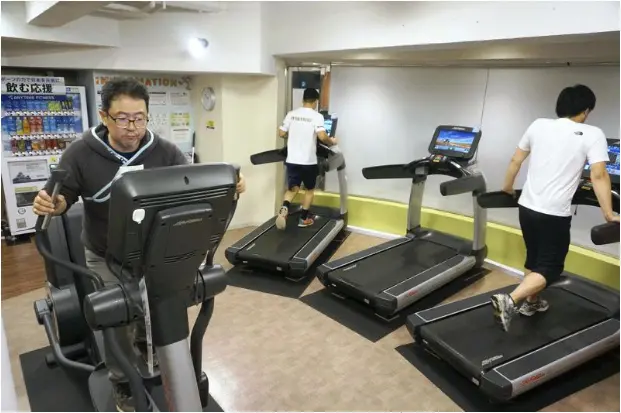Twenty-four-hour sports gyms, or fitness clubs that are open late at night and in the early morning, are increasing in number. Since people can go to these sports gyms regardless of the time of day, their use by company employees and others who finish work late at night is booming. There are some differences from conventional fitness clubs, such as that users have access to limited kinds of facilities.
People who have finished work visit a multi-tenant building in the shopping area of Meguro Ward, Tokyo, one after another, even after 10 p.m., to work out. One of the building’s tenants, the Yutenji branch of Anytime Fitness, is a sports gym equipped with about 30 training machines. With a floor space of about 230 square meters, the sports gym is smaller than conventional ones.
Anytime Fitness is a 24-hour fitness club chain that was founded in the United States in 2002. The first Anytime Fitness outlet opened in Japan in 2010, and now there are about 160 outlets across the nation, mainly in urban areas.
Basic setup keeps costs low
At an Anytime Fitness outlet, only minimum facilities are provided, such as running machines for aerobic exercise and weight machines for muscle training. While there are showers and dressing rooms, it does not have a whirlpool bath or a sauna.
“We provide only necessary facilities,” said an employee of the chain’s operator, Fast Fitness Japan.
People run on treadmills at the 24-hour sports gym Anytime Fitness in Yutenji, Meguro Ward, Tokyo. Photo: The Yomiuri Shimbun
Since Anytime Fitness outlets do not have costly facilities that conventional sports gyms are equipped with, such as pools and studios, the monthly fee is about ¥7,000, about 70 percent of that for conventional sports gyms. Since they are small, it is possible to open them in multi-tenant buildings near train stations or other places, which provides easy access for users, according to the company.
Nearly 90 percent of users are working people in their 20s to 40s, and many of them visit the gyms after 8 p.m.
A 23-year-old female company employee who came to the Yutenji gym said, “I usually finish work at around 9 p.m., then go home, change clothes and do exercise for about two hours.”
A 45-year-old hospital employee living nearby also said, while sweating during a workout: “Due to my work, I tend to go home late at night. So it was difficult for me to go to a conventional sports gym, but I can come to this place.”
Those two people are among many users of the chain who had nothing to do with fitness clubs before.
In response to rising demand, operators of major conventional fitness clubs have also started to operate 24-hour sports gyms.
Tipness Ltd., which operates sports gyms equipped with a wide variety of facilities, began operating the 24-hour sports gym FASTGYM 24 in 2014. The number of FASTGYM 24 outlets has already exceeded 50, and the Tokyo-based company aims to open 200 outlets mainly in residential parts of the Tokyo metropolitan area by 2020, according to Tipness.
While users can easily enjoy getting in a workout at 24-hour sports gyms, there are some points of caution.
In principle, there are no instructors at such sports gyms, so users need to think of an exercise routine on their own. During nighttime hours, while remote security is available, there are no staff on duty. So, it is better to confirm in advance how to deal with trouble such as injuries and machine malfunctions.
The Yomiuri Shimbun
‘Similar to jet lag’
It is also necessary to pay attention to the physical and psychological effects of doing exercise early in the morning or late at night.
Waseda University Prof. Shigenobu Shibata, who is well versed in the relationship between circadian rhythms and health, said, “If a person continues to exercise late at night for a long period of time, the person’s internal clock will be in night mode.” This means that the person will be in a state similar to jet lag, and is more likely to have insomnia and other symptoms, according to Shibata.
Meanwhile, it is dangerous especially for elderly people to do hard exercise early in the morning because it strains the heart and other organs. People should keep in mind the fact that they will easily get injured if their muscles are not sufficiently relaxed.
“I would like people to think carefully about the impact on their own lifestyles of exercising early in the morning or at midnight,” Shibata said.
(The Japan news)
 简体中文
简体中文



